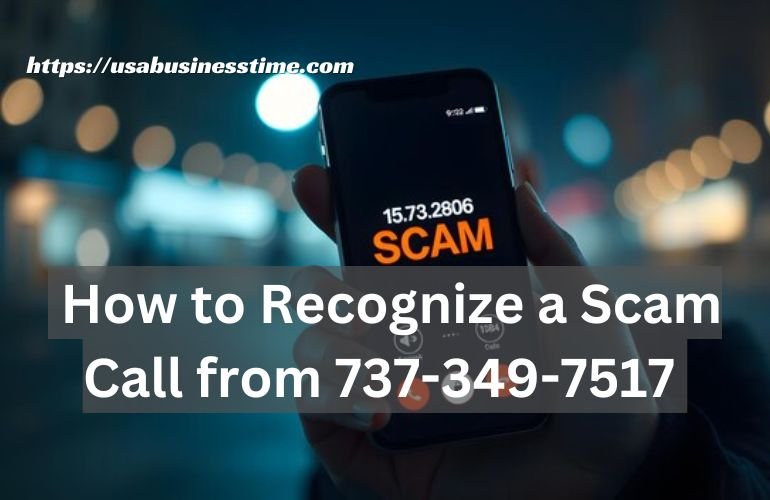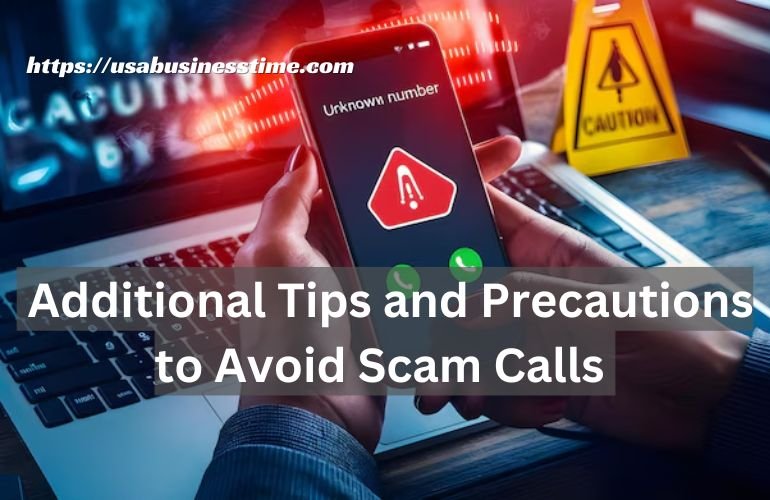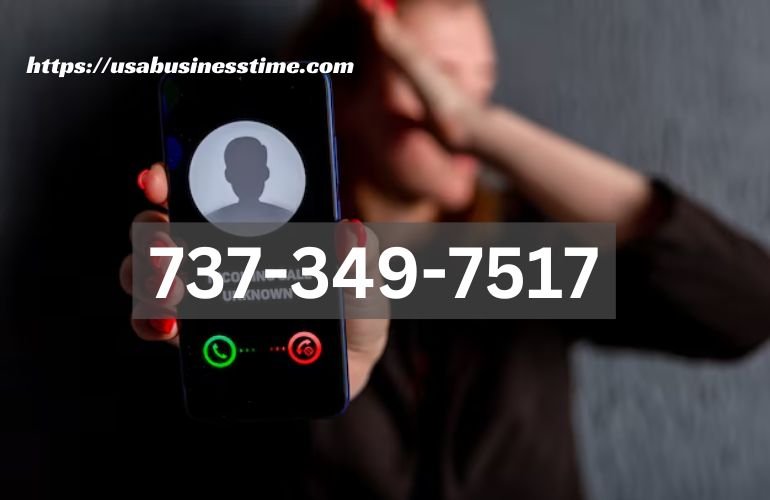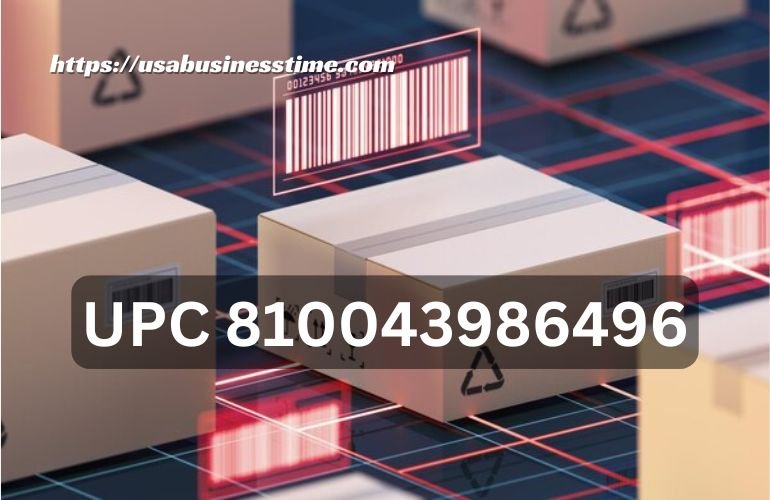The phone number 737-349-7517 has caught the attention of many due to its suspicious activity. People receiving calls from this number have reported strange behavior, ranging from unsolicited offers to potential scams. Understanding the risks associated with such calls is important to protect your privacy and avoid falling victim to fraud. In this article, we’ll explore the nature of these calls, how to identify if it’s a scam, and practical steps to safeguard yourself. Stay informed to stay safe.
Table of Contents
Is 737-349-7517 a Scam Number?
Many individuals have raised concerns about calls from 737-349-7517, often suspecting it to be associated with scams. Reports indicate that people receiving these calls encounter unsolicited offers or suspicious requests, which has led to questions about the legitimacy of the number.
Several common tactics are used by callers from this number, aiming to create a sense of urgency or confusion. These include pressure to act quickly, demands for sensitive information, or offers that seem too good to be true. It’s important to remain cautious when engaging with unknown numbers, especially when the behavior of the caller raises red flags.
Public reports and complaints about 737-349-7517 often highlight similar patterns. Many describe persistent callbacks, pushy sales tactics, or outright scams involving financial services, loans, or promotions that don’t exist. These repetitive call behaviors and misleading offers suggest a strong likelihood that the number is associated with fraudulent activities.
Staying informed and recognizing the warning signs of scam calls is the best defense. Always question unexpected calls and be aware that legitimate companies rarely ask for private details or payment information over the phone without prior consent or verification.
How to Recognize a Scam Call from 737-349-7517
Identifying a scam call from numbers like 737-349-7517 can save you from potential fraud. Several warning signs and behaviors are commonly reported by those who have interacted with this number. By staying aware of these patterns, you can better protect yourself from falling victim to scams.

Pressure and Urgency
One of the most common tactics used by scammers is creating a sense of urgency. They may insist that you need to act immediately or that there’s a limited-time offer, pushing you to make hasty decisions without having time to think. Legitimate organizations rarely pressure individuals this way, so it’s a strong indicator that something is wrong.
Unusual Requests for Personal Information
Another red flag is when a caller asks for sensitive information such as your Social Security number, credit card details, or bank account information. Legitimate companies do not request such details over the phone without prior authorization or proper identification. Always be cautious when asked to share personal data with unknown callers.
Too-Good-to-Be-True Offers
Scammers often tempt their targets with unrealistic promises, such as large sums of money, easy loans, or prizes. If an offer sounds too good to be true, it most likely is. These fake offers are meant to lure you in and then ask for something in return, such as fees or sensitive information.
Caller ID Tricks
In some cases, scammers might use fake caller IDs that appear to be from local or trusted numbers to make their calls seem legitimate. This technique, known as “spoofing,” tricks people into answering calls they would otherwise ignore. Always be cautious even if the number seems familiar or local.
Persistence and Repeat Calls
Another sign of a scam is persistent calling. Scammers often make multiple attempts to reach you, calling at different times of the day or over the course of several days. This persistence is designed to wear you down or make the situation seem urgent.
Pressure to Use Unusual Payment Methods
Requests for payment via gift cards, wire transfers, or other untraceable methods are clear signs of a scam. Legitimate companies use secure payment channels and never ask for payment in ways that are difficult to trace or recover.
By keeping these behaviors in mind, you can more easily spot a potential scam and protect yourself from fraud. Always approach unexpected calls with caution, especially if the caller displays any of these suspicious traits.
How to Protect Yourself from 737-349-7517 Scams
Taking preventive measures is key to staying safe from scam calls like those from 737-349-7517. Here are some practical steps to help safeguard your personal information and avoid falling victim to fraudulent schemes.
Block the Number
The simplest and most effective way to stop unwanted calls is by blocking the number on your smartphone. Almost all modern devices have the option to block specific numbers, ensuring that any future calls from 737-349-7517 are automatically rejected.
Use Call-Blocking Apps
There are many call-blocking apps available that can help filter out unwanted calls. These apps use large databases of known scam numbers to alert you when you receive a suspicious call. They can also block calls from unfamiliar sources, reducing the risk of interaction with scammers. Some popular options include apps like Truecaller and Hiya.
Register on the National Do Not Call List
Adding your number to the National Do Not Call Registry can reduce the number of telemarketing calls you receive. Although it won’t stop scammers entirely, legitimate businesses are required to respect this list, so it can cut down on the volume of unwanted calls.
Avoid Sharing Personal Information
Never share personal, financial, or sensitive information with unknown callers. Scammers often ask for details such as Social Security numbers, credit card information, or banking credentials. If you’re unsure of the caller’s identity, it’s best to hang up and verify their legitimacy through other means before sharing anything.
Be Wary of Payment Requests
Legitimate companies do not ask for payments through unconventional methods like gift cards, wire transfers, or cryptocurrency. If someone demands payment in any of these forms, it’s a major red flag that you may be dealing with a scammer.
Trust Your Instincts
If something feels off about the call or the person on the other end of the line seems too pushy, it’s best to err on the side of caution. Scammers often rely on pressure tactics to rush you into making decisions. Take the time to verify the legitimacy of any requests before taking action.
Report the Scam
If you believe you’ve encountered a scam, report the number to relevant authorities or online platforms. Many websites and services allow users to report suspicious numbers, helping others avoid similar scams. This can also aid in investigations aimed at reducing scam activity.
By following these steps, you can significantly reduce your chances of becoming a victim of phone scams. Staying alert and taking preventive action can protect your personal information and keep you safe from fraud.
Steps to Take If You Receive a Call from 737-349-7517
Receiving a suspicious call from numbers like 737-349-7517 can be alarming, but knowing how to respond can prevent you from falling victim to potential scams. Here are some practical steps to handle these calls effectively.
1. Avoid Answering Unknown Numbers
If you don’t recognize the number, it’s often best not to answer the call. Many scam calls come from numbers that look familiar, but answering these calls can lead to further issues like persistent callbacks or unwanted engagement. Letting the call go to voicemail allows you to assess whether the caller left a legitimate message.
2. Research the Number
If you receive a call and are unsure of its legitimacy, a quick search online can provide insights. There are several websites and databases that track scam numbers, where people report suspicious activity associated with certain phone numbers. Checking these platforms can help confirm whether others have experienced similar calls.
3. Block the Number
If a number seems suspicious or is tied to unwanted calls, blocking it is a simple solution. Most smartphones allow you to block numbers, which prevents any future calls from that number. If the caller is persistent, this can be an effective way to stop further harassment.
4. File a Call Report
Reporting the call to appropriate authorities or websites that track scam numbers helps others avoid the same issue. Filing a report also aids in tracking scam activity and can contribute to efforts aimed at stopping phone scams. Reporting the number to your phone carrier or regulatory agencies like the Federal Trade Commission (FTC) can be useful.
By following these steps, you can better manage suspicious calls and reduce the risk of falling for a scam. Staying vigilant and taking these precautions will protect you from engaging with potentially harmful callers.
What to Do If You’ve Been Targeted or Scammed
Realizing that you’ve been targeted by a scam can be unsettling, but taking immediate action can help minimize the damage. Here’s a guide to the steps you should take if you responded to a scam or suspect you’ve been compromised.

1. Stop Communication Immediately
If you suspect you are dealing with a scam, stop all communication with the scammer. This includes hanging up, ignoring any further calls, or stopping any ongoing conversations if you’re corresponding via email or text. Scammers may try to manipulate you into providing more information or taking actions that benefit them. Cutting off communication reduces their chances of taking advantage of you.
2. Protect Your Financial Accounts
If you’ve shared any financial details like credit card numbers, banking information, or even personal details like your Social Security number, contact your financial institutions immediately. Request to freeze your accounts or monitor them closely for any suspicious transactions. You may also want to change your passwords and update security questions for added protection.
3. Report the Incident to Authorities
After you’ve taken steps to protect your financial accounts, report the scam to the relevant authorities. Depending on your country, you can report scams to consumer protection agencies such as the Federal Trade Commission (FTC) in the United States. Many agencies provide resources to help victims of scams, and reporting can assist in tracking down scammers.
4. Check Your Credit Report
If sensitive information like your Social Security number was shared, monitor your credit report for unusual activity. You can request a free credit report from major reporting agencies, which allows you to spot any signs of identity theft. If necessary, you can also freeze your credit to prevent new accounts from being opened in your name.
5. Take Steps to Recover Lost Money
If you made a payment to a scammer, there may still be a chance to recover your funds. Contact your bank or credit card company to report fraudulent charges and request a reversal if possible. If the payment was made through a third-party payment service, reach out to their support team for assistance. In some cases, if you act quickly, the payment can be canceled or reversed.
6. Monitor for Identity Theft
After responding to a scam, it’s essential to keep an eye on your personal information. Watch out for any unusual activity on your accounts, such as unexpected bills, letters, or notifications. Many services offer identity theft protection or credit monitoring, which can alert you to any suspicious changes.
7. Educate Yourself for the Future
Being targeted by a scam can be a learning experience. Take the time to educate yourself about common scams and ways to protect yourself. Scammers constantly evolve their tactics, so staying informed helps you avoid falling into similar traps in the future. Look out for warning signs and stay cautious when sharing information over the phone or online.
These steps can help you regain control and prevent further harm after encountering a scam. Quick action and vigilance are essential for minimizing the risks and recovering from such incidents.
Real-Life Reports and Complaints About 737-349-7517
Many individuals have reported encounters with the phone number 737-349-7517, highlighting a range of troubling experiences. Understanding these reports can shed light on the nature of the calls and the tactics employed by the callers.
Common Experiences Shared by Victims
Numerous victims describe similar patterns in their interactions with this number. Many report receiving unsolicited calls that begin with aggressive sales pitches or unexpected offers. These calls often come at inconvenient times, creating a sense of urgency that pressures the recipient to act quickly. Victims frequently mention feeling overwhelmed or confused during the call, which is a typical tactic used by scammers to disorient their targets.
Repetitive Calls
Many people have noted that they receive repeated calls from 737-349-7517, even after expressing disinterest or requesting to be removed from the calling list. This persistence can be frustrating and alarming, leading to further concerns about the legitimacy of the number. Some victims feel that the callers disregard their requests, further raising suspicions about the intentions behind these calls.
Pushy Sales Tactics
Reports indicate that the callers often employ aggressive sales tactics, pushing recipients to make decisions on the spot. Many victims have shared experiences of being offered loans, financial services, or products that seem too good to be true. This pressure to commit quickly can lead individuals to make rash decisions without proper consideration.
Suspicious Offers and Requests for Personal Information
Victims frequently report being offered deals that sound appealing but raise immediate concerns due to their unrealistic nature. Calls may involve offers for free trials, discounted services, or promises of substantial financial gains. Additionally, many report being asked for personal information, such as Social Security numbers or bank details, which is a significant red flag.
Emotional Distress
The emotional impact of these calls cannot be understated. Many individuals report feeling anxious, frustrated, or even scared after receiving calls from this number. The feeling of being targeted by a potential scam can lead to stress and worry, especially if personal information has been shared or if there is a fear of financial loss.
Online Complaints and Reports
Victims have taken to online platforms to share their experiences and warn others. Websites dedicated to reporting scam numbers often feature numerous complaints about 737-349-7517. These reports highlight the need for awareness and vigilance among the public, as many individuals remain unaware of the tactics used by scammers.
By understanding the common experiences shared by others, individuals can be better prepared to identify and respond to suspicious calls. Awareness of these patterns can help people recognize warning signs and take appropriate action to protect themselves from potential scams.
How Scammers Exploit the 737-349-7517 Number
Scammers often utilize specific strategies to exploit phone numbers like 737-349-7517, capitalizing on human psychology and trust. Understanding these methods can help individuals recognize and avoid falling victim to similar schemes.
Creating a Sense of Urgency
One of the most effective tactics employed by scammers is instilling a sense of urgency in their messages. By claiming limited-time offers or imminent consequences, they pressure recipients to make quick decisions. This tactic aims to bypass rational thought, pushing victims to act impulsively without adequate scrutiny.
Manipulating Caller ID
Scammers frequently engage in a practice known as caller ID spoofing, which allows them to display a different number on the recipient’s phone. This can make the call appear as if it’s coming from a local or legitimate source, increasing the likelihood of the recipient answering. When people see familiar area codes, they are more inclined to engage, thinking they are dealing with a trustworthy entity.
Leveraging Trust Signals
Many scammers attempt to gain trust by using names of reputable companies or referencing well-known organizations. They may claim to be representatives of a financial institution, government agency, or well-known service provider. This tactic exploits the recipient’s familiarity with these names to lower defenses and create a false sense of security.
Employing Emotional Appeals
Scammers often play on emotions to manipulate their targets. They may invoke fear by suggesting urgent issues, like account suspensions or legal troubles, requiring immediate action. Alternatively, they might present enticing offers that appeal to desires, such as promises of money or valuable rewards, leading individuals to overlook warning signs.
Using Confusion and Complexity
Scammers may use complex language or jargon to confuse the recipient. By making the conversation seem complicated, they can create a scenario where the victim feels overwhelmed and uncertain. This confusion can result in individuals feeling compelled to comply with requests simply to resolve the situation.
Isolating the Victim
Another strategy involves isolating the victim from trusted sources of advice. Scammers may instruct individuals not to discuss the call with family or friends, suggesting that doing so could jeopardize the offer or lead to penalties. This tactic aims to eliminate the support system that might help the victim recognize the scam.
Repeated Contact Attempts
Scammers often employ persistent follow-up calls to reinforce their message. Repeated contact can create a sense of familiarity, making the victim more likely to engage over time. The more someone hears from a scammer, the more normalized the interaction becomes, increasing the chances of compliance.
By recognizing these exploitation methods, individuals can develop a more skeptical mindset when receiving unexpected calls. Awareness of these tactics is a key factor in preventing scam-related incidents and protecting personal information.
Additional Tips and Precautions to Avoid Scam Calls
Staying vigilant and informed can help protect you from scam calls like those from 737-349-7517. Here are several practical tips and precautions to consider that can enhance your defenses against these types of fraud.

1. Use Caller ID Wisely
While caller ID can provide useful information, scammers often manipulate it. Always verify unfamiliar numbers by researching them online. If a call seems suspicious, don’t hesitate to let it go to voicemail. You can listen to the message and decide if it’s worth responding to.
2. Perform a Reverse Phone Lookup
If you receive a call from an unknown number, a reverse phone lookup can reveal the caller’s identity. Many websites allow you to input the number and find information about its owner. If the number is linked to scams, this can help you avoid engaging with the caller.
3. Be Cautious with Your Personal Information
Protecting your personal information is essential. Avoid sharing details such as your Social Security number, bank account information, or credit card details over the phone. Legitimate organizations will never ask for this information in unsolicited calls.
4. Register for the Do Not Call List
Signing up for the National Do Not Call Registry can help reduce the number of telemarketing calls you receive. While it won’t stop all unsolicited calls, it can decrease the volume of calls from legitimate businesses that are required to respect the list.
5. Use Call-Blocking Features
Many smartphones and telecom providers offer built-in call-blocking features. Familiarize yourself with how to block numbers on your device. Additionally, consider using third-party call-blocking apps that can filter out known spam calls based on user reports.
6. Stay Informed About Common Scams
Knowledge is your best defense. Regularly update yourself on the latest scams and tactics used by fraudsters. Many consumer protection agencies publish alerts and resources about current scam trends. Being aware of common schemes can help you recognize potential scams more quickly.
7. Trust Your Instincts
If something feels off during a call, trust your instincts. It’s better to hang up than to risk sharing personal information. Scammers often rely on manipulation, so being skeptical can protect you from potential harm.
8. Report Suspicious Activity
If you receive a scam call, report it to the appropriate authorities. Many regions have agencies dedicated to handling consumer complaints about fraudulent activities. Reporting suspicious numbers can help protect others from falling victim to the same scams.
9. Educate Friends and Family
Share information about scam awareness with friends and family, especially those who may be more vulnerable, such as the elderly. Educating loved ones about common tactics and protective measures can create a stronger community defense against scams.
By implementing these tips and precautions, you can significantly reduce your chances of falling victim to phone scams. Maintaining awareness and being proactive are key components in protecting yourself and your personal information from fraudsters.
Conclusion
Staying vigilant against phone scams, such as those associated with the number 737-349-7517, is essential in today’s world. By recognizing the tactics used by scammers and implementing protective measures, individuals can safeguard their personal information and reduce the likelihood of falling victim to fraudulent schemes. Awareness, education, and proactive steps are key in combatting these deceptive practices. Remember that if you encounter a suspicious call, it’s always better to trust your instincts and take necessary precautions. Protecting yourself and sharing this knowledge with others can create a stronger defense against the ever-evolving landscape of scams.
FAQs
1. What should I do if I receive a call from 737-349-7517?
If you receive a call from this number, it’s best to avoid answering. If you do answer and feel the call is suspicious, hang up immediately. Consider blocking the number and reporting the call to relevant authorities.
2. How can I tell if a call is a scam?
Common signs of a scam call include pressure to act quickly, requests for personal information, offers that seem too good to be true, and persistent callbacks. If something feels off, trust your instincts and do not engage further.
3. Can I report a scam call?
Yes, you can report scam calls to your local consumer protection agency or the Federal Trade Commission (FTC) if you are in the United States. Reporting helps track fraudulent activity and can prevent others from falling victim to similar scams.
4. Are there any apps to help block scam calls?
Yes, many apps are designed to block unwanted calls and filter out spam. Popular options include Truecaller and Hiya, which can identify and block known scam numbers.
5. What should I do if I shared personal information with a scammer?
If you’ve shared personal information, stop all communication with the caller. Immediately contact your financial institutions to protect your accounts, monitor your credit report for unusual activity, and report the incident to the authorities.











